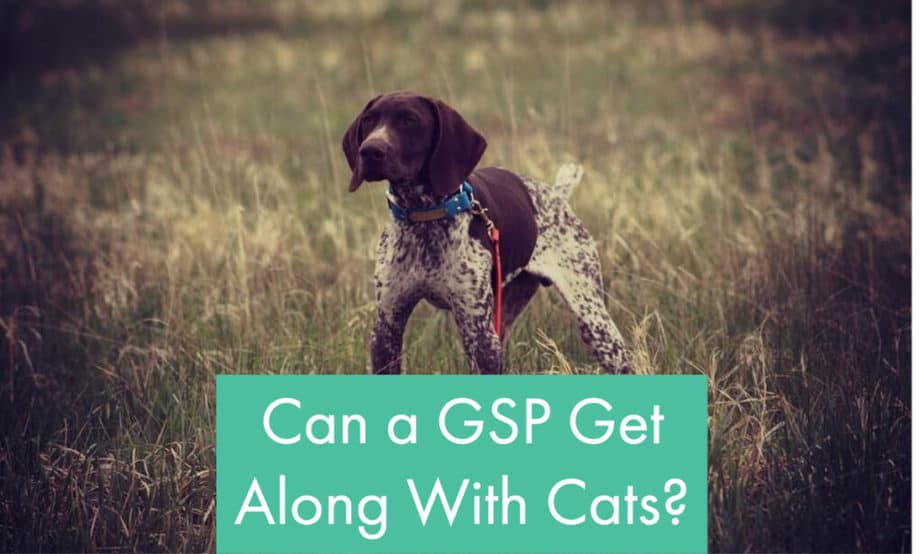On a recent outing to the park, a very frustrated dog owner was having a difficult time getting her German Shorthair Pointer (GSP) to stop barking at a cat perched in the tree.
It seemed like most of the other dogs didn’t care about the cat at all, and it made me wonder, can a GSP have a good relationship with felines?

The American Kennel Club (AKC) categorizes the GSP under the Sporting Group. Dogs in this category were primarily bred to assist hunters in retrieving small animals. The GSP has a high prey drive, and care should be taken with small animals like cats, birds, and rabbits.
To most cat owners, adding a Sporting dog to their household sounds like a horrible disaster just waiting to happen. Luckily, the situation might not appear as hopeless as you think – there are various factors that influence canine behavior.
Can A German Shorthair Pointer Get Along With Cats?
Why do some dog breeds have no problem with cats while other canines need an extended adjustment period?
To get to the reality of this mystery, we’ll need a deeper look into the breed’s characteristics – such as breeding purpose, temperament, and personality – to understand why GSPs need the training to get along with felines.
The Purpose Behind The GSP Breed
The AKC lists GSPs in the Sporting class; you’ll sometimes hear people refer to them as Gun Dogs, which is the UKC classification. The term you use will be irrelevant; the critical factor is that GSPs were bred for a particular purpose.
Pointers, retrievers, spaniels, and setters are classified as Sporting breeds.
AKC describes these breeds as “naturally active and alert,” primarily used to assist hunters in finding small animals from where they fell after the shot cracked through the air.
The inherited hunting capability of the GSP is what makes them see small animals like cats (or birds, bunnies, etc.) as prey – and not regard them as friends or companions.
GSP Temperament
Generally, GSPs are excellent family dogs; they are active and need a lot of mental and physical stimulation. Because Sporting dogs have astounding physical abilities, this also means that they have a lot of energy to burn.
If you are not providing your dog with enough exercise to expel the energy, your poor cat will draw the short straw and be left to entertain the dog with a reluctant game of chase up a tree.
Some dogs, including GSPs, can become jealous when their owners give attention to other pets.
This breed is considered a Velcro dog, which is why they are prone to possessiveness (and sometimes, intolerance of the family cat). Velcro dogs usually become attached to one individual, and your GSPs might want your attention all to themselves.
Individual Personalities Of The GSP Breed
One thing that most owners fail to consider is that despite breed temperament, dogs have individual personalities. Some dogs have chilled personalities, while others are as stubborn as a deaf mule; you can be either lucky or unlucky in this scenario.
If luck is on your side, it could very well be love at first sight for both canine and feline alike, and you’ll be the proud owner of a GSP that absolutely adores Mr. Mittens.
The scene playing out in this YouTube video should be enough to convince you that not all dog-cat relationships are doomed to fail.
An easy-going pooch would be ideal, but we need to prepare for the worst (since life isn’t always fair).
When you find yourself fresh out of luck, you’ll need to desensitize your GSP from the moment they put their tiny puppy paws on your floor.
Despite breed characteristics and unique personalities, dogs are a product of the guidance they receive from humans. Fortunately for all involved, training and socialization should not be an issue for your GSP.
Training And Socializing A GSP
GSPs are remarkably intelligent and highly trainable. With patience and a proper training regimen (we’ll have a look at some essential training tips below), you can train your GSP to coexist with your cat.
Training and socialization for any dog are crucial to prevent unwanted behavior.
Before you start your training, the most important thing you can do is to introduce your GSP pup to the cat using a five-step process. Remember to reward both pets for calm behavior.
- Start by introducing their scents first
- Next, you should feed them on opposite sides of a closed-door
- When they do not react negatively during feeding times, put your puppy in a crate and let the cat wander around; they should see and smell each other but not be able to touch
- Next, put your pup on a leash and allow them to interact, but do not let the GSP give chase
- Your final step would be to have them in the same room (off-leash), starting with five minutes and working your way up as they get used to each other
If your GSP doesn’t seem interested in your cat at all, don’t push the matter. As pet owners, we’d love to see them as companions, but a disinterested GSP is a lot better than an over-interested one that chases your cat all around the house.
Tips On How To Train Your GSP To Accept Your Cat
With a better grasp of why GSPs need a little extra guidance to accept small animals as part of the family, we can get into how to prevent this ingrained need to chase.
Desensitizing a Sporting breed will take some time, but if you follow the tips below, your GSP and cat should be able to get along without a problem.
- Please don’t wait too long to start the training process; give your puppy a little time to adjust to their new surroundings but start the sessions as soon as possible. Keep in mind that puppies do not have a good attention span. Start with five minutes, and increase the session time as they grow.
- Check with your local community for information on great trainers in your area and sign up for puppy classes. Remember, early socialization is the best foundation for a well-rounded dog.
- As the time-old saying goes, “patience is a virtue,” and you’ll need it. Getting frustrated won’t help at all. Dogs feed off human emotions; if you are stressed out, they’ll draw the negative energy from you. If you are in control and calm, your dog will feel that too.
- Be consistent, always. Don’t let minor slips go just because you are not in the mood the deal with the situation as it happens; dogs need routine and a clear set of boundaries.
If all else fails, you can look into dog trainers (or behaviorists) to assess the situation and advise on the best way forward. These professionals have been around the block a couple of times and know the tricks of the trade.
A great thing about dog trainers is that they work on the relationship between owner and dog to help you get (and maintain) control over your dog – in a way establishing yourself as the “pack leader” to better handle challenging canine personalities.
Conclusion
GSPs are a Sporting breed with a predisposition to chase smaller animals. This breed is not usually the first choice for households with cats due to their breeding purpose. However, individuality is an important factor that most people tend to overlook.
Cat owners might caution you against getting a German Shorthair Pointer if you have a cat. But, keep in mind that you can undoubtedly take control of the situation with training while the pup is young.

